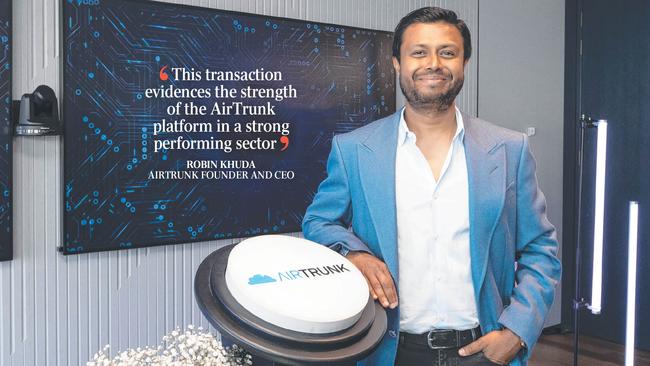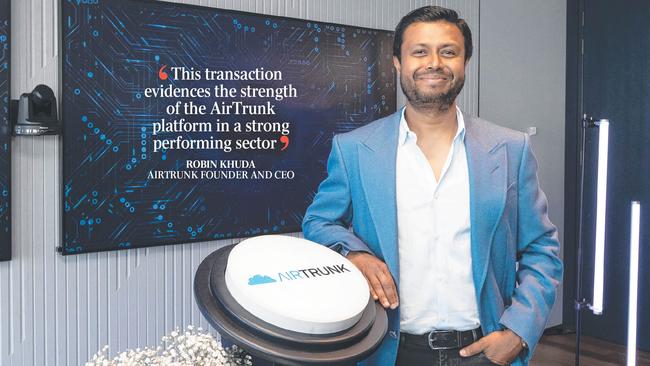Blackstone buys AirTrunk for $24bn in historic deal
Blackstone hopes to capitalise on ‘unprecedented demand’ for digital infrastructure with its largest ever investment across the Asia Pacific region.

Blackstone hopes to capitalise on “unprecedented demand” for digital infrastructure with the $24bn-plus acquisition of data centre operator AirTrunk, as the global asset management giant trumpets its largest ever investment across the Asia Pacific region.
Following lengthy legal delays which held up the announcement of the mammoth transaction, Blackstone and the Canada Pension Plan Investment Board on Wednesday evening confirmed they had agreed to buy Sydney-headquartered AirTrunk. The company operates data centres across Australia, Japan, Malaysia, Hong Kong, and Singapore, and is 88 per cent owned by Macquarie Group’s asset management arm and PSP Investments.
AirTrunk’s chief executive Robin Khuda and staff hold about 12 per cent and the statement confirmed the CEO would stay on to lead the company, following a change of control. Mr Khuda is understood to have reduced his stake in AirTrunk as part of the transaction, and will be left with about 5 per cent of company on deal completion.
Sources said that ensured him a huge payday, but retained some alignment to the new owners.
The Blackstone and CPP transaction does, however, require the approval of the Foreign Investment Review Board. It ranks among the biggest five ever mergers and acquisitions of an Australian target and was not far off the $32bn takeover – including debt and cash – of Sydney Airport three years ago. Other transactions among the nation’s biggest include the takeover of shopping centre giant Westfield in 2017 by European group Unibail Rodamco, BHP’s sale of its petroleum business, and the acquisition of Newcrest Mining by US group Newmont.
Blackstone completed the $8.9bn acquisition of Crown Resorts in 2022, in another major Australian deal.
Globally, it’s a race to get a seat at the table as technology giants, investment houses and real estate groups look to increase their involvement in data centres.
Blackstone’s president and operating chief Jon Gray said the firm was seeking to capitalise on its “highest conviction” theme.
“AirTrunk is another vital step as Blackstone seeks to be the leading digital infrastructure investor in the world across the ecosystem, including data centers, power and related services,” he added.
Blackstone cited figures anticipating about $US1 trillion ($1.49 trillion) of capital expenditures in the United States over the next five years linked to the building and facilitation of new data centers, and a further $US1 trillion of capital expenditures outside the US. Prior to acquiring AirTrunk, Blackstone’s portfolio comprised $US55bn of data centres including facilities under construction, along with more than $US70bn in “prospective pipeline development”.
Macquarie’s asset management arm - which invested in AirTrunk via its second Asia-Pacific Infrastructure Fund - and PSP Investments will reap a huge windfall on their 2020 investment in AirTrunk, that at the time valued the company at just $3bn.
“Our journey with AirTrunk, and the drive and foresight of our teams in Asia Pacific, has resulted in AirTrunk expanding its footprint across key markets in the region, achieving a more than eightfold increase in contracted capacity,” said Ani Satchcroft, Macquarie asset management’s co-head of infrastructure for Asia Pacific.
The “transaction demonstrates MAM’s ability to identify, invest in, and nurture digital infrastructure assets that are resilient, scalable and pivotal”.
But some fund managers lamented what the bumper sale of AirTrunk meant for the ASX and investors in public markets.
“Does the sale of AirTrunk to Blackstone mean that capital-hungry businesses are now ignoring the listed market? It just shows for the most part listed markets are pretty lazy when it comes to deciphering the value of these investments,” said Gabriel Radzyminski, Sandon Capital’s managing director. “Listed markets are just terrible at ascribing value to these things.”

Sandon owns a stake in ASX-listed Global Data Centre Group, which owns a small holding in AirTrunk, and has been divesting its other investments.
Asked about the growing trend for companies to remain private rather than list publicly, Australian Retirement Trust’s chief investment officer Ian Patrick said the swelling pool of private capital seeking a home meant companies like AirTrunk no longer had to rely on public markets.
“What you’re seeing with AirTrunk is what (used to be) a higher risk, core-plus (investment) – maybe even higher up the risk spectrum than that – is now an infrastructure asset trading to more established owners,” he said.
“It’s mature now, it’s got the development pipeline in place, the business model is proven, and there’s the AI (artificial intelligence) tailwind. All of those things have come together.
“For a growth business like that, being in private hands as opposed to public hands, probably makes sense.”
Tribeca portfolio manager Jun Bei Liu said the ASX didn’t house enough companies like AirTrunk, which were expanding within and outside Australia.
“In terms of the (sale) multiple this really is showcasing how much real institutional demand there is for this type of asset. It really solidifies our belief that this is going to be a mega decade trend,” she said.
“As listed investors we were really looking forward to the listing of this asset and it’s a shame that’s gone unlisted.”
Ms Liu added that the AirTrunk sale showed it wasn’t just NVIDIA winning the AI race but the whole AI ecosystem that was benefiting from demand dynamics.
Macquarie and PSP had considered a sharemarket float, but given a dearth of listings and huge demand from private capital for data centre assets, opted for a trade sale process instead.
In the statement, Blackstone’s global head of infrastructure Sean Klimczak and co-head of real estate Nadeem Meghji said digital infrastructure was experiencing “unprecedented demand” buoyed by artificial intelligence and digitisation of economies. The pair said Blackstone wanted to “further accelerate” AirTrunk’s growth plans.
Mr Khuda said: “This transaction evidences the strength of the AirTrunk platform in a strong performing sector as we capture the next wave of growth from cloud services and AI and support the energy transition in Asia Pacific.
“For AirTrunk, this is just the beginning, as we continue to capture the significant opportunities from the region’s vibrant digital future.”
Data centre operators have, however, come under fire for their huge consumption of energy, with many now looking to increase their usage of renewable sources of power.
Blackstone has been active in the data centre sector. Earlier this year it snapped up the former Britishvolt industrial site in northeast England to advance plans to build large data centres. The project was reported as having earmarked investment of up to £10bn in the region. CPP has also shown interest. In 2021, the firm formed a joint venture with Japan’s Mitsui & Co for an investment fund with projects spanning hyper-scale data centres in Tokyo and Osaka.Blackstone has invested in debt and equity across data centre companies, including as owner of QTS, Coreweave and Digital Realty.
A host of large global companies are looking to increase their exposure to data centres around the world, including in Australia.
Microsoft in May struck a deal with Brookfield Asset Management to plough more than $US10bn into developing renewable energy capacity to power rising demand for artificial intelligence and data centres.
Microsoft is also investing $5bn in hyperscale cloud computing and artificial intelligence infrastructure in Australia, which includes adding nine data centres. That will take the group’s data centre footprint to 29 across Canberra, Melbourne and Sydney.
In June, a KKR-led consortium and Singtel agreed to invest $S1.75bn in ST Telemedia Global Data Centres.
Additional reporting: Cliona O’Dowd



To join the conversation, please log in. Don't have an account? Register
Join the conversation, you are commenting as Logout